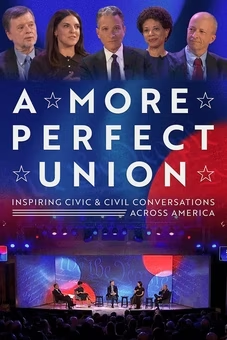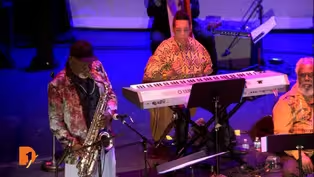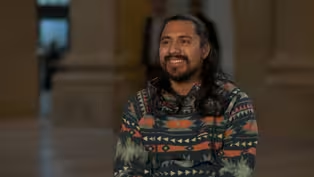
Play about Holocaust photo album, “Here There Are Blueberries” opens at Detroit Public Theatre
Clip: Season 10 Episode 14 | 7m 30sVideo has Closed Captions
One Detroit’s Chris Jordan attended a rehearsal and talked with the cast and crew.
Detroit Public Theatre has opened its new season with a play that tells the true story of a photo album donated to the United States Holocaust Memorial Museum in 2007. It was filled with pictures of Nazi officers at a concentration camp taking part in everyday activities. The production runs through November 2 and follows the museum curators as they examine the history and impact of the photos.
Problems playing video? | Closed Captioning Feedback
Problems playing video? | Closed Captioning Feedback
One Detroit is a local public television program presented by Detroit PBS

Play about Holocaust photo album, “Here There Are Blueberries” opens at Detroit Public Theatre
Clip: Season 10 Episode 14 | 7m 30sVideo has Closed Captions
Detroit Public Theatre has opened its new season with a play that tells the true story of a photo album donated to the United States Holocaust Memorial Museum in 2007. It was filled with pictures of Nazi officers at a concentration camp taking part in everyday activities. The production runs through November 2 and follows the museum curators as they examine the history and impact of the photos.
Problems playing video? | Closed Captioning Feedback
How to Watch One Detroit
One Detroit is available to stream on pbs.org and the free PBS App, available on iPhone, Apple TV, Android TV, Android smartphones, Amazon Fire TV, Amazon Fire Tablet, Roku, Samsung Smart TV, and Vizio.
Providing Support for PBS.org
Learn Moreabout PBS online sponsorship- No one but me has identified.
- No one.
- If more Nazi descendants like you would be willing to speak to us, it would be hugely helpful.
But-- - But you're a Holocaust museum.
- Exactly.
- [Chris] A classroom at Mosaic Youth Theatre in Detroit, mid-September, Detroit Public Theatre is rehearsing for their fall play.
- "Here There are Blueberries" is a play based on an album of photographs.
This album of photographs was donated to the United States Holocaust Memorial Museum.
And when they opened it, they saw that it was just the perpetrators of the Holocaust, sort of chilling.
Most of the time, they're not really doing their job at Auschwitz.
You see them hanging out at a sort of resort.
You see them hanging out with the young women who were the secretaries.
And so when this album was donated to the museum, it did something to people.
It really saw the quotidian sort of daily life nature of what it was to be a perpetrator of the Holocaust.
And we at Tectonic Theater Project felt that feeling, and we said is there a play here?
- I had the pleasure of seeing "Here There are Blueberries" in New York at New York Theatre Workshop.
And my first thought was what a dream it would be to bring this play to Michigan, to Detroit, to Detroit Public Theatre.
- [Chris] Sarah Winkler is one of the producing artistic directors at Detroit Public Theatre.
- Tectonic said to us, we would be okay with allowing you to be the first theater in the States that is not us to produce this play.
So Detroit Public Theatre and Detroit gets to see the first licensed production of "Here There are Blueberries," and it's really a deep partnership because Amy came, you know, an artist who helped build this piece over nearly a decade.
- Director Amy Marie Seidel was part of the original team who created the play at Tectonic Theater Project in New York.
- We created this play with all of the elements of the stage in mind from the beginning.
And one of the super important parts of that were the images.
We knew that the core of the narrative of this piece was gonna be told in the images themselves.
And so it asked the question, how do you tell a play through an album of photographs and make it theatrical?
- But it's really the second part of the sequence with the women that stands out the most.
It's this page.
The caption says, "Hier gibt es blaubeeren," here there are blueberries.
People called us and said these people look normal.
These girls look like teenage girls because they were.
One caller even said I know I never could have been a Mengele.
I know I never could have been a Hucker, but could I have been a Helfer?
- Cheryl Turski plays the real life archivist who worked with the photo album to uncover its history and who was interviewed extensively by Tectonic Theater Project to develop the play.
- She's being faced with these questions that she didn't ever think she would really have to ask herself, such as like, oh, I am similar to some of the women depicted in the album in terms of age or where I was in my life.
And I am now asking this question of what I would've done at that time.
- So what did they actually know?
- Most of what you're seeing in "Here There are Blueberries," is based on interviews that we did.
So we interviewed historians, we interviewed experts.
We went to Poland and Germany, and we interviewed the children and grandchildren of the high powered Nazis depicted in the album.
And for me, when I was at those interviews in Germany, looking into the eyes of the people who don't have the luxury of distance, something shifted for me.
I watched a man in his 80s grapple with a loving father who was both warm and culpable in terms of genocide.
And most of us, I think, especially in the United States, we have the luxury of distance from the perpetrators of this event.
But those people did not have that luxury.
And so looking in the eyes of those people who were grappling with that warm father who was also the culpable Nazi, I think is at the heart of this play.
- So you feel that your father, he had a conscience.
- Yes, of course he had a conscience.
- So you've come to terms with his participation?
- No.
- No?
- Absolutely not.
- This is a play about history, and yet the lens of history allows us to reflect on the present day and on what we dream of for the future.
There's a beautiful restraint to the storytelling in this piece that really allows you to enter the story without, without judgment and allows you to really, really reflect on yourself and what your responsibility is to society and what your responsibility to history is.
- We translate experience into knowledge.
And I think that the play is doing that.
It's translating these experiences into knowledge for the audience.
- There are moments when these images take over the stage, and there's nothing like being in the audience and having the images take over the stage.
You're confronted with them in an entirely different way than I think you are in a museum or in a film documentary.
Having a collective experience like that with these images, I think it's able to do something quite special.
- They were 11 or 12 when Hitler came to power.
Their formative years were spent getting fed this ideology.
What would I have done?
- We have developed a really beautiful partnership with the Zekelman Holocaust Center.
They have been an amazing resource.
They are not only sharing word about the play with their audience and their constituents, but they are also, they're providing set pieces like the archival boxes.
And they're also, they have also opened up the museum and their education department and their archivists as a resource for the cast.
They are also participating as panelists in a number of post-show dialogues.
(director quietly talking) - It's a gift for the audience to be able to process, draw their own conclusions, and then be able to take a look in the mirror and ask, what history are we in now?
And how do I change from my seat, not from somebody else's seat, from me, a little bit in this world to be a little bit better.
And I think the play does its job when every person in the audience goes away thinking about that.
Detroit’s Wendell Harrison performs in this year’s Concert of Colors
Video has Closed Captions
Clip: S10 Ep14 | 3m 49s | Detroit PBS’ “Best of Concert of Colors” features Detroit jazz musician Wendell Harrison. (3m 49s)
How one woman’s breast cancer diagnosis served as a call to action for Black women
Video has Closed Captions
Clip: S10 Ep14 | 9m 37s | Lisa Whitmore Davis chronicles her personal health journey in her film “The Whitmore Project.” (9m 37s)
José Robinson shares how he reconnected with his Latino roots
Video has Closed Captions
Clip: S10 Ep14 | 1m 26s | Detroit resident José Robinson participates in One Detroit’s “Destination Detroit” series. (1m 26s)
Providing Support for PBS.org
Learn Moreabout PBS online sponsorship
- News and Public Affairs

Top journalists deliver compelling original analysis of the hour's headlines.

- News and Public Affairs

FRONTLINE is investigative journalism that questions, explains and changes our world.












Support for PBS provided by:
One Detroit is a local public television program presented by Detroit PBS


